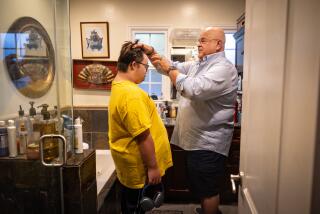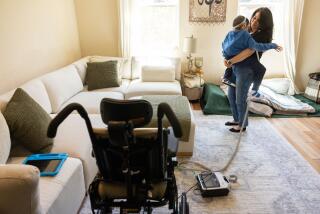Health Clinics Overwhelmed by Cash-Strapped Patients : Just when services need to be increased, corporate and individual donors are less able to give.
- Share via
When planners at the Venice Family Clinic prepared their budget for this fiscal year last May, they figured the clinic would have to expand services by 8% to account for the recession that already had begun.
Their guess wasn’t even close.
“We had 46,500 visits in 1991--a 35% increase,” clinic Executive Director Fern Seizer said. “That’s pretty dazzling.”
The clinic, the largest of its kind on the Westside, continues to turn away 40 or more people a day, and it is scrambling to come up with enough funds to meet the increased demand.
Like most other social service providers from Santa Monica to Hollywood, clinic operators live in fear of the double whammy of a recession: Just when services need to be increased, corporate and individual donors generally are less able to give. Luckily, the Venice clinic raised $4 million for the upcoming fiscal year, which starts July 1, compared with $3.7 million this year.
“The response has been wonderful,” Seizer said. “People are digging more deeply, responding to meet the urgent need.”
But the recession is showing no signs of abating, and Seizer and others fear they will soon be inundated as never before.
“There are so many people without jobs and without hope of getting jobs,” Seizer said. “I don’t see the light at the end of the tunnel.”
Across town, the staff at the Los Angeles Free Clinic, at 8405 Beverly Blvd., was seeing so many people that it recently opened a walk-in clinic three mornings a week.
“But we could run clinics 24 hours a day seven days a week if we had enough money and volunteers, and that still wouldn’t be nearly enough,” Mary Rainwater, the clinic’s associate director, said.
In October, the free clinic conducted a survey of its clients and found that more than 85% had no medical insurance. More than a third of them worked part time, and 47% said they had no job at all.
At the Didi Hirsch Community Mental Health Center in Culver City, more than 80 people a day stream in for outpatient treatment.
“We could see at least double that number, if we had the space and the resources,” Executive Director Ann Brand said.
The Hirsch clinic, the largest free mental health center on the Westside, has suffered through staggering budget cuts this year, in large part because the recession has cut into traditional sources of funding. Its contribution from United Way was down $40,000, for example, because of across-the-board cuts that United Way made in its funding of local social services agencies.
The cuts, Rainwater added, come at a time when the need for mental health services is greatest. Family economic problems often contribute to increased alcoholism, drug abuse and domestic violence.
“The stress of seeing your life and your family’s life deteriorate, and your inability to change that, creates anger and depression,” Rainwater said. “It goes round and round in a downward spiral, and there’s no way out.”
“For these people, there is no safety net, is there?” she asked. “If there is, it’s just not adequate.”
More to Read
Sign up for Essential California
The most important California stories and recommendations in your inbox every morning.
You may occasionally receive promotional content from the Los Angeles Times.










